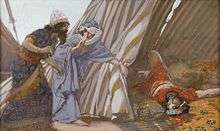Barak

| שופטים Judges in the Bible |
|---|
| Italics indicate individuals not explicitly described as judges |
| Book of Joshua |
| Book of Judges |
| First Book of Samuel |
Barak (/ˈbɛəræk/ or /ˈbɛərək/;[1] Hebrew: בָּרָק, Tiberian Hebrew: Bārāq, Arabic: البُراق al-Burāq "lightning") was a ruler of Ancient Israel. As military commander in the biblical Book of Judges, Barak, with Deborah, from the Tribe of Ephraim, the prophet and fourth Judge of pre-monarchic Israel, defeated the Canaanite armies led by Sisera.
Background
The son of Abinoam from Kedesh in Naphtali, Barak's mother was from the Tribe of Benjamin. His story is told in the Book of Judges, Chapters 4 and 5.
Biblical story
The story of the Hebrews' defeat of the Canaanites led by Sisera, under the prophetic leadership of Deborah and the military leadership of Barak, is related in prose (Judges Chapter 4) and repeated in poetry (Chapter 5, which is known as the Song of Deborah).
Chapter 4 makes the chief enemy Jabin, king of Hazor (present Tell el-Qedah, about three miles southwest of Hula Basin), though a prominent part is played by his commander-in-chief, Sisera of Harosheth-ha-goiim (possibly Tell el-'Amr, approximately 12 miles (19 km) northwest of Megiddo).
Deborah summoned Barak, the son of Abinoam, from his home at Kedesh in Naphtali, and ordered him, in the name of YHWH, to take ten thousand men to Mount Tabor. He agrees to on condition that Deborah should go with him. Here he was attacked, as Deborah had expected, by Sisera, whose forces were put to flight, and the greater part of them slain, by Barak's army.[2]
Because Barak would not go to battle without Deborah, the honor of victory did not go to him, but rather to "a woman" (Judges 4:9). Most authorities believe this passage refers to Jael's killing of Sisera in her tent following the battle,[3][4][5][6], while others believe this refers to Deborah herself.[2]
Defeat and death of Sisera

In the battle at Mount Tabor, a cloudburst occurred, causing the river to flood, thus limiting the maneuverability of the Canaanite chariots. Sisera fled, seeking refuge in the tent of a Kenite woman, Jael. Jael gave a drink of milk to Sisera, who fell asleep from weariness, then killed him by pounding a tent peg through his head. When Barak arrived, she showed him Sisera, dead in her tent.
Etymology
Barak ברק means lightning in Hebrew. Barcas, the surname of the famous Hamilcar Barca, is the Punic equivalent of the name.[2]
In the New Testament
The Epistle to the Hebrews 11:32-34 praises Barak's faith which gave him victory.
References
- ↑ Jones, Daniel; Gimson, A. C. (1977). Everyman's English Pronouncing Dictionary (14th ed.). London: J. M. Dent. p. 40. ISBN 0-460-03029-9.
- 1 2 3 "Barak", Jewish Encyclopedia
- ↑ Kenneth Barker, Gen. Ed., The NIV Study Bible. Zondervan Publishing House, 1995, p.330, note on Judges 4:1-5:31.
- ↑ "Ellicott's Commentary for English Readers" (1905), "Benson Commentary" (1857), others, Bible Commentaries on Judges 4:9
- ↑ Albert Barnes, "Commentary on Judges 4:9", Barnes' Notes on the Whole Bible (1870)
- ↑ Elie Assis, "The Hand of a Woman: Deborah and Yael (Judges 4)," http://www.jhsonline.org/Articles/article_49.pdf The Journal of Hebrew Scriptures, Volume 5, Article 19 (2005) ISSN 1203-1542